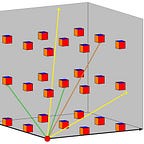A Problem That Changed My Mind About Mathematics
In this article, I want to discuss one of the earliest problems which completely changed my viewpoint of mathematics and pushed me to pursue a career in it.
This problem is from the 2009 British Mathematical Olympiad which I first came across when attending a problem session ran by my University’s mathematics society. The problem is the following:
Find all nonnegative integers a and b such that
Before looking at one possible way of solving this problem, which requires nothing more than school-level arithmetic, I want to explain why I like this problem, and problems of this nature, so much. Growing up, I loved detective/mystery novels, tv shows, movies, whatever. Being able to construct a solution based on some scattered information seemed almost like a superpower to me.
Looking back now, it seems obvious to me that I would have an interest in mathematics, but of course, I didn’t know that at the time. I just thought mathematics was there to do a job and that was it. Whether it was for calculating your taxes, working out the tensile strength of building materials, or following your baking recipe, I understood mathematics had a purpose, but it almost seemed it was just about knowing the right formula and applying it. Yawn! For some people, this is still how they see it. I hope this problem can at least justify why my mindset began to change. For me now, I see every math question as a puzzle. A mystery to be solved and studying mathematics is just a way of fine-tuning my detective abilities and adding to my tool kit.
Let’s begin our solution to the problem. The first step most people would take is to square both sides of the equation. This is something we are always told to do when dealing with square roots. It’s certainly what I tried. Let’s do this with the equation as it is, so we have
Ok, so this is a little nicer, maybe. We have reduced the number of square roots, which is good, but we have also made an unintentional problem for ourselves.
This is the first thing this problem taught me. Sometimes, before jumping in and just applying a method that seems right, ask yourself:
(i) Is this indeed the best method you know for dealing with this problem?
(ii) If this is the best method you know, is the problem set up in the best way for you to apply it?
